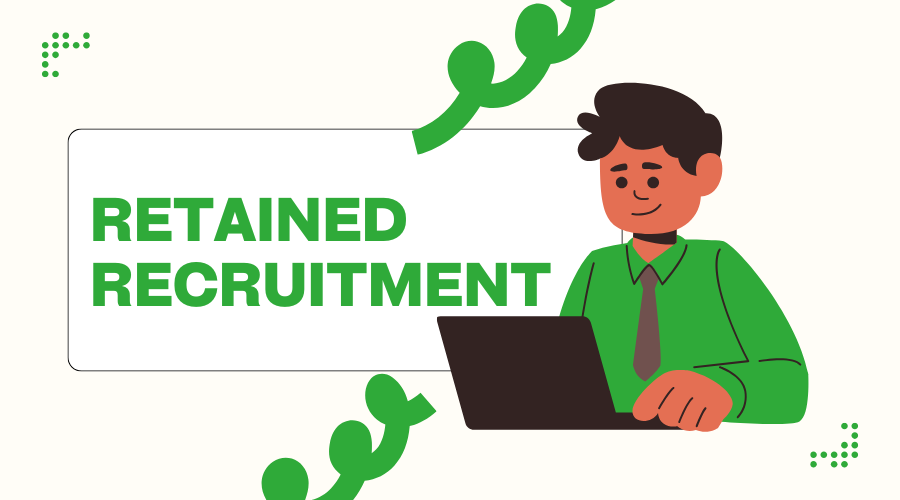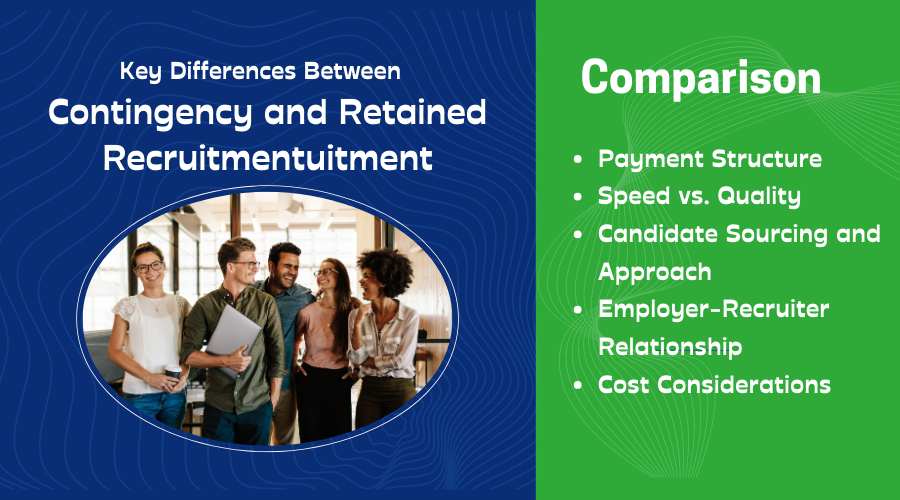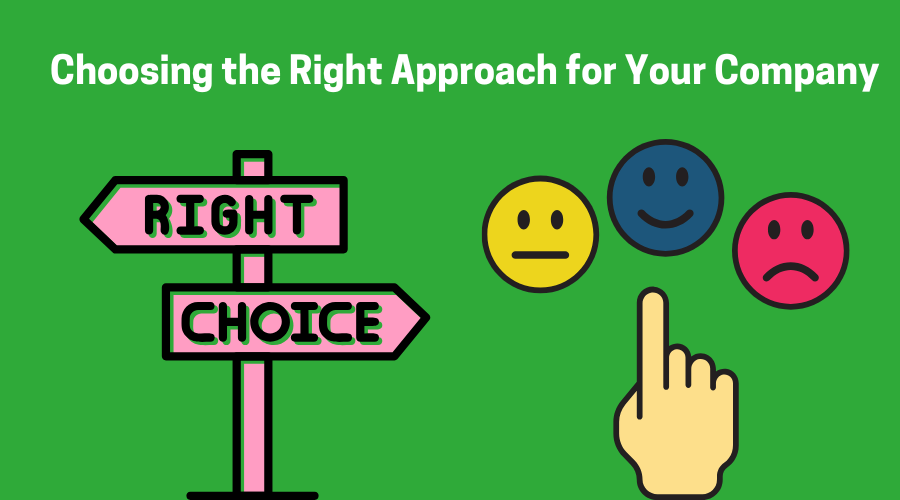
When hiring top talent, businesses often get confused between two choices: retained recruiter vs contingency as both approaches have advantages and disadvantages. So, choosing the right one decides the quality of hires, cost, and overall hiring experience.
If you ever thought about what is retained search? Or what is contingency recruitment? , you’re not alone because many companies try to understand the difference between retained search vs contingency search and how each method fits as per their hiring needs.
In this blog, you’ll learn about contingency recruiting and retained recruitment with their detailed comparison that will help you choose the right approach for your business. You’ll have a clear understanding of retained recruiter vs contingency and how you can choose the best hiring strategy.
Understanding Recruitment Models
When companies need to hire, they prefer professional recruiters but not all recruitment methods work the same way. The two most common are contingency recruitment and retained recruitment and they both have their own hiring process, so knowing how these models work can help businesses make a better choice for themselves.
What is Contingency Recruitment?
Contingency recruitment refers to the hiring model where recruiters only get paid if they successfully place a candidate. It means multiple recruitment firms compete against each other to fill the same position and the first recruiter to fill the position gets paid while others receive nothing. Contingent recruitment has no upfront cost which makes it a low-risk option for employers.
The contingency recruitment method is mostly used by mid-level and entry-level positions where urgent hiring is needed. Companies want to test multiple recruiters, that’s why they don’t pay until they fill the position.
Advantages of Contingency Recruitment
- No upfront cost – You only pay if you hire someone otherwise it costs you nothing.
- Faster hiring process – Recruiters move quickly to find candidates because they want to get paid.
- Access to multiple recruiters – You can work with several firms at a time and choose the best one.
Challenges of Contingency Recruitment
- Lower candidate quality – The recruiters focus on fast hiring, not quality hiring, so they don’t do deep evaluations.
- Less control over the process – Recruiters don’t take time to understand company culture due to which they don’t hire the professional ones.
- Competition over collaboration – Multiple recruiters work against each other instead of focusing on the best hire.
For urgent hiring needs, contingency recruiting is a great option. But for specialized or senior roles, a more strategic approach may be needed.
What is Retained Recruitment?

Retained recruitment, also known as retained search recruitment, follows a different approach where companies pay a recruiter an upfront fee to perform in-depth research and hire qualified candidates. In this approach, the focus of the recruiter is to find the best possible candidate, not the fastest one.
The retained recruitment method is commonly used by executive search, senior position hires, and positions where an expert is needed. This results in a more strategic, high-quality hiring process rather than a quick placement.
Advantages of Retained Recruitment
- High-quality candidates – Recruiters conduct deep assessments and interviews to choose the best candidates.
- Exclusive commitment – The recruiter works solely on the role that you need ensuring full attention.
- Access to passive candidates – They target top professionals who aren’t actively job hunting.
Challenges of Retained Recruitment
Of course, retained recruiter vs contingency is also a matter of investment because of the main drawbacks it includes:
- Upfront cost – Companies pay even if a hire isn’t made immediately which costs them too much.
- Longer process – Finding the perfect candidate takes time.
- Not ideal for urgent hiring – If you need a role filled ASAP, contingency may be faster.
Despite the cost, companies looking for long-term hiring success often prefer retained search. If finding the right leader is more important than hiring quickly, retained recruitment could be the best choice to hire the right candidates.
Key Differences Between Contingency and Retained Recruitment

You’ll now have a clear understanding of retained recruiter vs contingency and how they both work. Both of these methods have different purposes and choosing the right one depends on your company’s needs and demands. Let’s discuss the detailed comparison between retained recruiter vs contingency.
Payment Structure
One of the biggest differences between contingency and retained recruitment is their payment structure which describes how recruiters get paid.
As in contingency recruitment, you don’t pay anything upfront so the recruiters often deal with multiple roles at once because they want to successfully place as many candidates as possible.
On the other hand, retained recruitment requires costs from beginning to end that might be paid in stages part upfront, part during the process, and the rest upon successful hire. Retained recruiter give their time so they focus more on quality rather than the volume of the candidate.
Which is better? If you want a no-risk option, contingency is a good choice but if you’re looking for a dedicated and thorough approach, retained recruitment is worth the investment.
Speed vs. Quality
The second key difference between a retained recruiter vs contingency is how quickly the recruiters find candidates and how well they are evaluated.
Contingency recruiters struggle to fill roles as fast as possible without doing deep research. To increase the number of chances of making a placement, this process is about submitting as many resumes as possible while retained recruiters take their time and perform industry research to find the best candidates. In the end, the candidates are best fit for the roles as they get selected after proper research.
Which is better? If you need to fill a position urgently, contingency recruiting is faster, but for executive roles or niche positions, retained recruitment ensures better long-term results.
Candidate Sourcing and Approach
Another common difference between these two methods is how recruiters find candidates and engage with them.
Contingency recruitment mainly focuses on those candidates who are already seeking for new role and are applying for jobs. These recruiters rely on job boards, databases, and LinkedIn to quickly find candidates.
On the other hand, retained recruiters struggle to source passive candidates who aren’t actively looking for jobs but might be open to the best opportunities and due to this, retained search vs contingency search is often a choice between casting a wide net or using a laser-focused approach.
Which method is better? If you want access to a larger pool of candidates, contingency recruitment gives quick results. But if you need specialized talent that isn’t actively job-hunting, retained search is more effective.
Employer-Recruiter Relationship
The level of commitment and collaboration between the company and recruiter also differentiate between the two methods.
With contingency recruitment, there’s no exclusivity—you can work with multiple agencies at the same time. But since recruiters only get paid if they make a placement, they may not spend as much time understanding your company’s needs. The focus is on filling the role quickly, not necessarily on building a long-term hiring strategy.
In retained recruitment, the recruiter works exclusively with your company as they take time to understand your business, culture, and long-term hiring goals. Instead of just filling a vacancy, they act as a strategic hiring partner, helping you find the right talent for growth and success of your company.
Which is better for you? If you prefer a transactional relationship where multiple recruiters compete, contingency is fine but if you want a dedicated, long-term partner, retained search is the best choice.
Cost Considerations
Cost always plays a crucial role in decisions and here’s where retained recruiter vs contingency shows a clear difference.
Contingency recruiting is cheaper upfront since you only pay if a candidate is hired. However because multiple recruiters work on the same job, the quality of candidates may be lower which leads to potential hiring mistakes and higher turnover costs.
Retained search requires an initial investment, but it usually leads to better-quality hires because these recruiters conduct deeper evaluations, companies often end up with employees who stay longer and perform better, ultimately saving money in the long run.
Which is better? If your budget is tight, contingency hiring is appealing, but if you see recruitment as a long-term investment, retained hiring pays off over time.
Choosing the Right Approach for Your Company

You clearly know the key difference between retained and contingent hiring but now you might be confused about whom you should choose; should you go with retained search or contingency recruiting? Well, the answer depends on your hiring needs, budget, and the amount of effort you want to put in to find the perfect fit for you.
The most important point is that your choice should match your needs and for this, you need to follow the right approach. Here’s the detailed breakdown:
The key is to match the right approach to the right situation. Let’s break it down in more detail.
When Contingency Recruitment is the Best Choice
If you’re hiring for a role that needs to be filled quickly, contingency recruiting could be the better option than retained because these recruiters focus on speed and volume which makes it ideal for companies that need multiple hires or are in industries with high turnover rates.
For example, if an e-commerce company needs to hire 10 customer service employees, they probably choose contingent recruiting because this role is easy to fill and there is a need for more speedy work.
Other situations where contingency recruiting works best for you:
- The role is mid-level or entry-level and doesn’t require months of researching talents in the industry.
- Your industry has a large talent pool which makes it easy to find qualified candidates.
- You want to work with multiple recruiters to see who delivers the best results.
- You don’t want to pay upfront and prefer only to pay when a successful hire is made because you don’t have too much budget.
When Retained Search is the Best Choice
On the other hand, retained recruitment could be the best choice for companies that need the best possible candidate, not just the fastest hire. This approach works well for executive positions, leadership roles, and specialized jobs that require a unique skill set.
For example, if a company needs to hire a tech expert to solve their technical problems, they would prefer retained search as they need expertise and leadership skills.
Other situations where retained search is the better option:
- You’re hiring for a role that requires deep industry expertise or leadership experience.
- You want a hands-on recruiter who thoroughly assesses candidates and presents only the best matches for you.
- You need access to passive candidates who aren’t actively looking but would move for the right opportunity.
- You prefer a strategic hiring process over just filling the role as quickly as possible.
Can You Use Hybrid Approach
Some companies take a hybrid approach, using contingency recruitment for mid-level and high-volume hiring while reserving retained search for key leadership roles.
For example, a tech startup might use contingency recruiting to quickly hire software developers but choose a retained recruiter to find a Vice President of Engineering who can lead the team long-term.
This balanced approach increases efficiency while ensuring high-quality hires get the attention they deserve.
Conclusion:
When it comes to retained recruiter vs contingency, there’s no right answer; just the best approach for your specific hiring needs.
If you’re looking for speed and flexibility, contingency recruiting is a great option, especially for mid-level or high-volume hiring. It allows you to work with multiple recruiters, and you only pay when you make a hire. But keep in mind, it’s often a race to submit candidates, which can lead to less vetting and more work on your end.
On the other hand, if you’re hiring for executive roles, leadership positions, or specialized talent, retained search is the better choice. It’s a dedicated, strategic approach where recruiters take their time to find the perfect fit not just someone who meets the basic requirements.
Many companies even combine both methods, using contingency recruiting for faster, lower-level hiring and retained search for critical leadership roles. The key is to match the right approach to the right role.
In the end, the success of your hiring process depends on clarity and knowing what you need, how urgently you need it, and what level of quality you’re looking for. By understanding the strengths and limitations of each approach, you’ll be able to make an informed decision that sets your company up for long-term success.
FAQs: Retained Recruiter vs Contingency
1. What is the main difference between retained search and contingency recruiting?
The biggest difference is how recruiters are paid and how they approach the search. Retained recruiters are paid upfront to conduct a dedicated, in-depth search for the best candidate. Contingency recruiters only get paid if they successfully place a candidate, making the process faster but less exclusive.
2. When should a company choose retained search?
Retained search is best for executive, leadership, or highly specialized roles where quality is more important than speed, it’s better when you need a strategic hiring process, access to passive candidates, and a recruiter who works just for your company.
3. Is contingency recruiting a good option for startups?
Yes! Startups often benefit from contingency recruiting because in this model, there is a very low risk ratio, you only pay when you make a hire. It’s especially useful when hiring for mid-level roles or building a team quickly. However, for key leadership positions, startups may still want to consider retained search to get the best fit.
4. Can a company use both retained and contingency recruiting?
Absolutely! Many companies use a hybrid approach; they use contingency recruiters for mid-level and high-volume hiring while using retained search for senior executives or those roles that require expertise.
5. Do retained recruiters guarantee a hire?
Retained recruiters don’t guarantee a hire, but since they are paid upfront, they are fully committed to finding the best possible candidate. They work closely with your company to ensure a strong match, which leads to better long-term hiring success.
6. Which option is more expensive: retained or contingency?
Retained search is typically more expensive upfront because it involves a dedicated, highly specialized process. However, contingency recruiting can be costly in the long run if companies have high turnover rates and need to rehire frequently.
7. Do contingency recruiters present the same candidates to multiple companies?
Yes, because contingency recruiters are not specific to one company, they may present the same candidates to multiple employers. This means you could be competing with other companies for the same talent.
